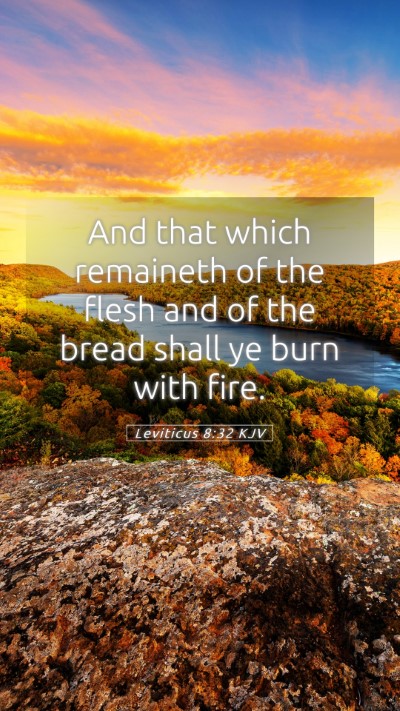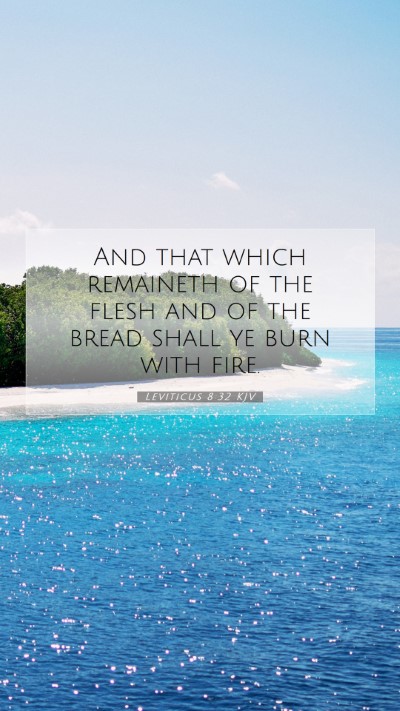Understanding Leviticus 8:32
Leviticus 8:32 states: "And that which remaineth of the flesh and of the bread shall ye burn with fire." This verse comes at a pivotal moment in the book of Leviticus, where the consecration of Aaron and his sons as priests is described. This verse serves to outline the specific instructions regarding the remaining portions of the offerings that were not consumed. Here is a comprehensive understanding of this verse broken down with insights from various public domain commentaries.
Bible Verse Meanings
The meaning of Bible verses often requires an understanding of their historical and cultural context. In this instance, Leviticus deals with the Levitical priesthood and the sacrificial system that God established for His people. The instruction to burn the remaining flesh and bread signifies the holiness and respect that must be afforded to things pertaining to God.
Scripture Analysis
According to Matthew Henry, this act of burning what remains indicates a complete offering to God, symbolizing that God deserves our full devotion and the remnants must not be treated casually. The act of burning signifies purification and the need to remove anything unclean or inappropriate from the sacred context.
Adam Clarke further emphasizes that this act not only relates to the offerings but also serves as a symbolic gesture toward spiritual cleanliness, as all items dedicated to God must be disposed of properly to maintain their sanctity.
Insights from Other Commentaries
- Albert Barnes notes that this directive revolves around the importance of order within the worship practices, highlighting that God’s requirements reflect His desire for receiving worship in a structured, reverential manner.
- Referring to the principles laid out in the Mosaic Law, each act of sacrifice had a purpose, and the disposal of leftovers in a holy manner was part of that instructional framework meant to reflect God's holiness.
Bible Study Insights
Incorporating this verse into Bible study groups can spark various discussions on the themes of holiness, dedication, and the significance of obeying God's commands in worship practices. Understanding Scripture can illuminate how these ancient practices still hold relevance in contemporary faith life.
Cross References
This verse can be compared to:
- Exodus 29:34 - Discusses the remainder of consecrated offerings.
- Leviticus 7:17 - Details about what to do with remaining flesh of sacrifices.
- Numbers 18:9-10 - Speaks to the holy gifts given to the priests.
Conclusion
In summary, Leviticus 8:32 teaches us about the importance of treating the sacred with reverence and adhering to divine instructions regarding worship. The principles outlined through this verse encourage readers to grasp the broader implications of God’s commands, inspiring practices that would transcend time and culture.
For those seeking deeper Bible verse interpretations and commentary, this analysis serves as a resource for understanding not only the individual verse but also its connection to the wider narrative of the Scriptures.


